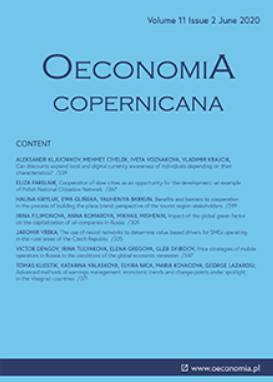Mobbing and corporate social responsibility: does the status of the organisation guarantee employee wellbeing and intentions to stay in the job?
Mobbing and corporate social responsibility: does the status of the organisation guarantee employee wellbeing and intentions to stay in the job?
Author(s): Jolita Vveinhardt, Agnieszka SrokaSubject(s): Labor relations, Organizational Psychology, Behaviorism, Management and complex organizations, Human Resources in Economy
Published by: Instytut Badań Gospodarczych
Keywords: workplace mobbing; employees’ emotional state; employee intentions; CSR; Poland & Lithuania;
Summary/Abstract: Research background: In spite of abundant evidence that Corporate Social Responsibility (CSR) contributes to improving the emotional state of employees as stakeholders and can serve as a useful tool for reduction of their turnover in organizations, until now, it remains unclear how the different status of CSR is related to consequences accompanying mobbing. Purpose of the article: This study compares the emotional state and intentions of Polish and Lithuanian organizations’ employees who have experienced mobbing with regard to the status of CSR. The paper presents part of the results of a wider study conducted in two neighbouring states, which are exclusively related to the employees’ emotional state and employee intentions after experiencing mobbing in the workplace. Methods: The research sample involved 823 respondents employed in Lithuania and Poland. The questionnaire survey was conducted using the questionnaire “Mobbing as a Psychosocial Stressor in the Organizations Accessing and Implementing Corporate Social Responsibility — MOBCSR”. Comparisons are made with regard to and CSR and relate to Lithuania (LT) and Poland (PL), when organisations are divided into three groups: (I) Is CSR; (II) Seeks to be-come CSR and (III) Does not seek to become CSR. Mann-Whitney U test and Kruskal-Wallis H test were used as the research methods. Findings & Value added: CSR is related to employees’ better emotional state and lesser intentions to leave the organisation, but the study revealed unexpected results showing that according to certain parameters, the situation in the organisations seeking CSR was better than in those already declaring this status (e.g. the feeling of hopelessness, reluctance to seek better results, etc.). It is discussed why the results between countries that have similar historical experience and are culturally close differ. The conclusions emphasize the necessity for practitioners and researchers to evaluate the impact of change on employees’ emotional state and intentions at different stages of CSR implementation more carefully.
Journal: Oeconomia Copernicana
- Issue Year: 11/2020
- Issue No: 4
- Page Range: 743-778
- Page Count: 36
- Language: English

